Want to cut down on some of the almost inevitable rattles in your motorhome or campervan? Start right here…
Because it rolls – and shakes – your motorhome or campervan is going to rattle. Even the best-made vehicles develop unwanted noises at certain times. With a bit of skill, though, you might be able to keep them down without having to resort to turning the stereo up. And also prevent a costly mishap when you arrive at your chosen destination.
Watch this video with expert tips from experienced motorhomers if you want to have a (non) rattling good time when you’re touring…!
A few top tips to reduce motorhome rattles
- Go plastic or bamboo? Glass rattles… and can cause serious problems if it breaks. Plastic is an altogether more user-friendly material when you’re touring. Use it for storage (anything from herbs and spices and up). Also, you’ll be surprised that you can get good quality plastic drinking glasses these days, too.
- If you’re insisting on glass bottles of drink, simple mesh collars will prevent them from banging against each other.

- Plastic-handled or bamboo cutlery and serving utensils rather than all-metal can be a good sound-deadener. Again, it’s not hard to source decent quality products nowadays.
- Put a sheath around any sharp blades. Not only is this good for personal safety, but it will also help to prevent the possibility of unwanted noises.
- Put paper plates between your dishes and use the packaging from your pots and pans.
- Remove the microwave plate and ring when in transit. Simply wrap it in another tea towel and pop it in a locker with your clothes – or back in the microwave!
- If you have a wardrobe, go for padded or velvet-wrapped hangers that won’t rattle if they don’t have clothing on them, or wrap the rail in a tea towel or J-cloth.
- Drop down beds can be a source of rattles. Kat from Wandering Bird uses a ratchet strap on one side of the bed and a pillow on the other side pushed between the bed and the wall.
- Martin Dorey suggested taking a friend on a drive with you to identify the source of your campervan or motorhome rattles: “You can’t hear the rattles when it’s not moving,” said Martin. “Go on a rough road, take a passenger and they can safely listen around the van to try to isolate where the sound comes from.”
Proper packing is key to preventing rattles
General advice is to pack heavy items as low as possible (even a tin of baked beans can become a lethal missile in a road crash and can quickly tumble out of a locker onto the oven top for a motorhome insurance claim when you arrive at your campsite!) Also, pack really bulky items like awnings on the floor so that it’s above or between the axles.
Other tips to reduce accidental damage
- Proper packing means less chance of any damage when you’re travelling or even when you arrive at your destination. Worktops, for example, are easily damaged by small but heavy items accidentally falling out of high-level lockers. It can make for a costly repair process and a common motorhome insurance claim for accidental damage.
- Packing items in stacking storage boxes, baskets, or felt storage bags will not only prevent rattles but will help to prevent things from falling out of cupboards when you reach your destination.


- Lightweight items designed for camping or outdoor use are often more appropriate than heavier versions designed for home use.
- You’ve probably already got a fridge, but if you want to supplement this, a soft-sided coolbag can help – squishing it down when it has products in it will stop them from clanking together.
- By all means bring your best china with you on tour, just be wary of the need to be more careful and to wrap it all up properly when you’re on the move.
DIY?
Adding a retaining clip or two can work wonders. It’s not unusual for drawers or doors to fly open whilst on the move. Leisure vehicle accessories shops (and, often, boat chandlers) sell them – often in the same design as other catches etc in your vehicle.
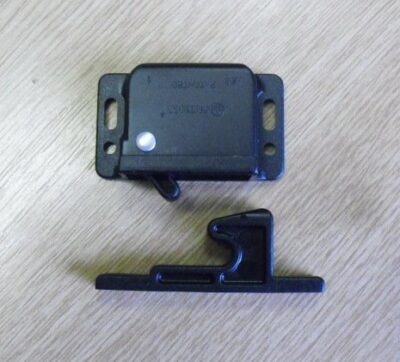
Also tightening the screws on cupboard latches or adjusting them slightly so they close properly will help dampen the noise – as will adding door buffer stickers.

Jon from Life Beyond Bricks told us that motorhome blinds are often the source of motorhome rattles and strips of felt placed strategically on the blinds can help dampen those rattles.

There are a few products for home use that can be cut down to fit in your motorhome lockers. One owner cut down this wire racking shelving, which is great for keeping tins and jars secure when travelling. See above for keeping tinned items stored low down.
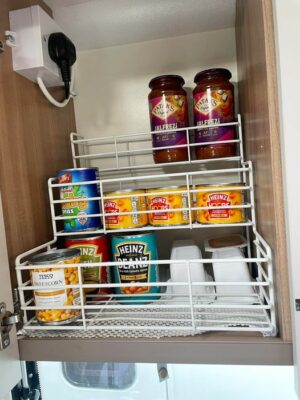
Motorhomer Bob Earnshaw used a piece of foam from a whisky bottle and stuck it underneath the worktop extension to stop the rattling from the magnetic catch!
Do note if you’re planning major modifications – removing or changing items of furniture, for instance – it might be worth checking with the manufacturer first in case there are consequences for structural integrity and/or warranties. Sound-deadening materials for van conversions and campervans are available from a wide range of brands. They will definitely reduce road noise (and up insulation levels if you don’t already have any side wall insulation fitted).
Just don’t go overboard with modifications… it could de-value your leisure vehicle when it comes to trade-in time.
Ten great products that will help reduce rattles in your motorhome and protect your gear
- Tea towel
Yes, the humble tea towel can be a real game-changer when it comes to battles against rattles. Put one between the (glass, usually) lid and the hob cover as well as the cover and the gas burners (oh, but do check the hob cover hasn’t lost any of its rubber lugs) and you’ve solved a key source of rattles.
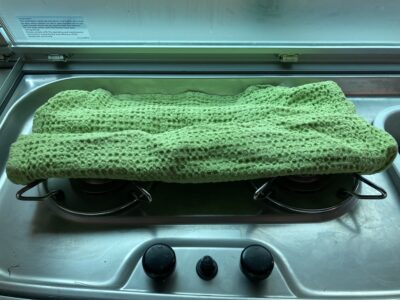
Same for the oven and grill – just get wrapping! You’ll need a few towels, most probably. Do make sure your cooker is cool before you give it the tea towel treatment, however.

Also, removing the shelf from the oven and wrapping it in a towel will help to reduce the rattling noise!

If you have a microwave and a glass plate, remove it during transit, or wrap it all up with a tea towel.
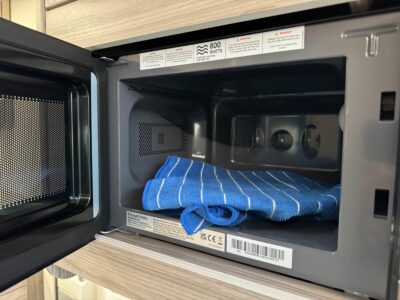
A tea towel or two packed tightly over the top of your cutlery drawer will reduce rattles too.
- Shelf liners and foam
Loose lining material that can be cut to fit is ideal for lining the bases of lockers and shelves – and it can make a world of difference. It helps stop items moving about, for a start. There’s also non-slip matting which would work well here. You can even wrap your pans in it too!

Different thicknesses are available from different sources.

Pieces of foam. Expanding, from a can. Self-adhesive strips. Even, pipe lagging. Whatever form it comes in, foam can be a great suppressor. Don’t forget it has insulation properties, too.
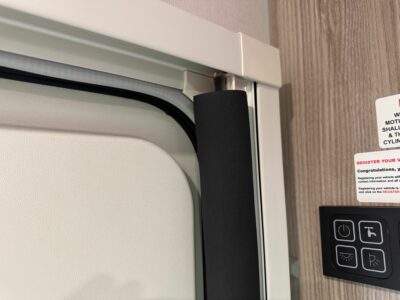
Using the foam sheet packaging used when you bought your new pots or pans is great for stopping rattles and protecting them for longer. Or Matt Simms from That Leisure Shop suggested asking your local supermarket if you can take sheets of bubble wrap that are sometimes found in the fruit and veg section!
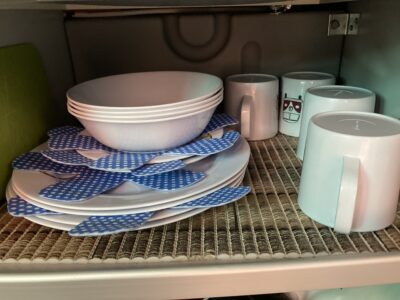
Or try these anti-scratch pan protectors – great for plates too!
-
Magnetic strips and tableware
silwy®promises rattle-free travel in your motorhome, campervan, or caravan with its patented magnetic system. Its range of glasses and tableware have magnets integrated into the bottom of them to secure them to metal nano-gel-pads or metal strips which are stuck into your lockers. A metal-nano-gel mat keeps its magnetic glasses in place too.
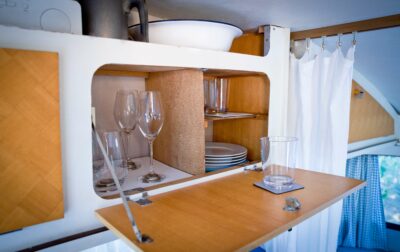
The silwy® metal-nano-pads and mat can be used pretty much anywhere and will adhere to all sealed surfaces. They’re also removable, washable and reusable. Its metal strip allows you to store glasses and cups upside down for the ultimate space saver. Note it cannot be removed once in place.
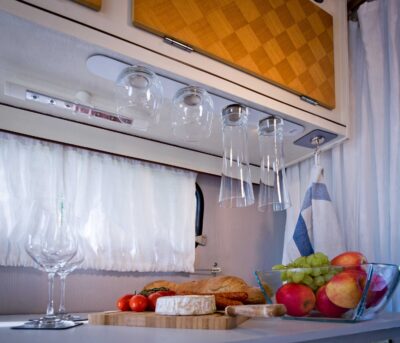
There are also magnetic spice jars on the market which attach to a magnetic plate. Kat Bird uses these as it stops glass spice jars chinking about when driving!

- Adhesive pads
Again, variety is key here. Grab yourself a pack of different-sized adhesive pads and you can happily while away an hour or more adding them wherever there’s a gap that turns into a rattle as soon as you’re on the move. These are great for sealing gaps between locker doors or ill-fitting furniture etc.
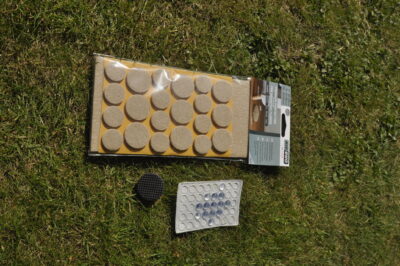
- Silicone spray
It’s not just rattles. You might well find over time you develop little issues like squeaky hinges and locker catches that start failing. You won’t need much, but the smallest squirt of silicon spray or (where appropriate) a proprietary oil-based spray like WD40 will work wonders.
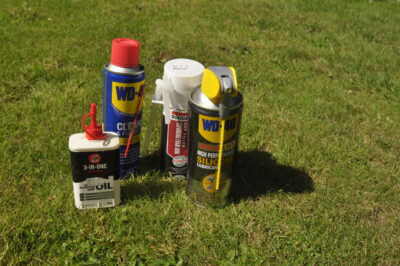
A creaky floor could be the sign of something worse. Get your vehicle booked in for a full habitation check!
- Screwdriver
Or rather, a set of. Go around your vehicle and gently tighten all the screws. It can make a real difference. Just don’t over-tighten.
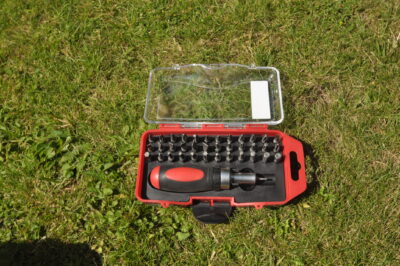
- Plastic boxes and crates
Gathering up smaller items and holding them in a suitably sized crate in a locker will reduce the propensity for any rattling about – and may make them easier to find when you need them. You could even re-use cardboard shoe boxes!

A set of small plastic boxes with lids will always prove their worth, too – for similar reasons. Make sure they’re suitable for food use, dishwasher safe, freezer-proof etc.
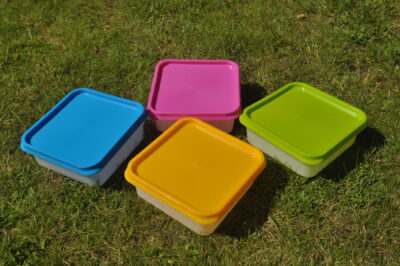
- Top tapes
Add a roll of adhesive tape to your vehicle’s “first aid kit” or toolbox. More, in fact. Insulating tape, foam-backed tape etc. Even fabric sticking plaster on a roll (so that you can cut it to size). They will all serve a rattle-cutting purpose, such as between the fixtures and the motorhome door, or windows and blinds.
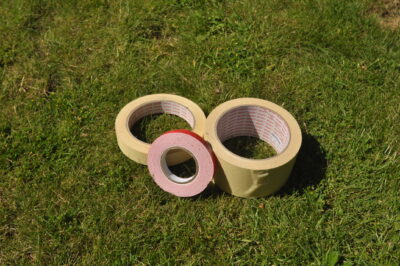
- Pegs
A selection of clothes pegs will always come in handy when you want to suppress a spot of clatter. Not a sure-fire guarantee, but they can often reduce rattles from blinds, rooflights etc. You might have to experiment a bit here.
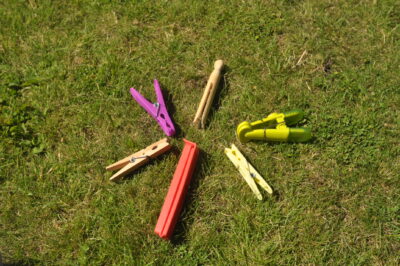
If pegs won’t do it, carry a selection of elastic bands with you – like so much of the above, they’re truly multi-purpose. Elastic bands around your cutlery will help to stop them rattling around when on the move.
- Fiamma Omni Stop
Here’s a clever device for keeping a set of plates in place – and yes, stopping them from rattling. Coming in two parts that simply slot together, there’s a metal sleeve and a plastic arm that moves up and down to suit, depending on how many plates you want to stack.
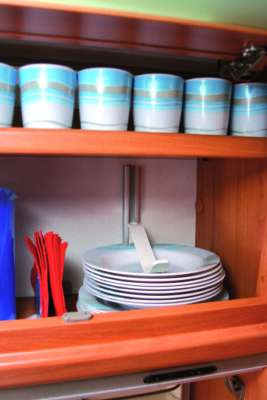
Our thanks to Lakeland for its help in suggestions and some of the products mentioned above, as well as Bob, Jon, Tash, Martin, Matt and Kat for their expert tips.
Also, don’t forget your local specialist iron mongers – if you’re lucky enough to have one – can be a great source of rattle-curing items you’ve never even thought of. And advice.
Over to you…
Got any advice on how to reduce rattles in your motorhome and to keep things in place to prevent surface damage that you’d like to share? Please feel free to add a comment below.



Use old cardboard toilet rolls, cut up the side and place around glass spice jars to stop rattles. In the winter you can paint the toilet rolls to jazz them up!
Polar fleece is much better and cheaper than the shelf liners for silencing.l bought 4″ foam and cut out circles for plates,cups etc.lt was pricey but silence is golden.
Thanks for sharing Christine
We are a big fan of teatowels under the hob cover. Makes a big difference & would be packing them anyway
ive been fitting and repairing upvc doors, window hinges/mechanisms for years, have a Bailey Autograph, i use silicone spray but for all round lubricant / release you cant beat GT85, multi-purpose spray ptfe lubricant oil, i never use wd40, releases rust but strips all the goodness out.
Thanks for the top tip Loz
A Neoprene lap top sleeve (available in pound shops and the like) are great for oven trays.
WD40 is not really a lubricant, the WD is short for Water Displacement. Silicone spray lubricant is a better product for lubricating squeaky hinges.
Sauce pans, metal pie dishes and grill pan are enclosed in bubble wrap bags, not sure where we got the bags unless we vandalised some large jiffy bags.
Great idea Phil
We use bubble wrap on our microwave plate and the grill tray on the cooker.
Thanks for sharing this great tip Angela
A good informative article or us newbies. Thanks.
Shoe boxes are great for packing – ours contain tons, jars, games and bits and bobs – and plastic pull-out fridge containers increase capacity and stop rattles and fall-iut.
Thanks for sharing Sheila
Re. WD40 for squeaky hinges – the hinges on the rear door of my Romahome campervan were so stiff the fibreglass around them was beginning to develop cracks! I tried pretty much everything to no avail. Then I tried one of the oils for my bike chain and it freed them up after just one application – I was amazed! So my recommendation for any similar problems is Muc-Off URBAN 4 WET OIL – brilliant stuff!
My mum and friend crocheted some doilies for between plates and dishes, they get used daily to save noise n chips when stacking up plates and dishes, also between mugs as well as protection to crockery when traveling.
Great idea Lee – thanks for sharing!
Great article however I wouldn’t use WD40 anywhere near my motorhome. It seems to be the ‘go to’ quick-fix remedy suggested for everything. In my experience it strips out any existing necessary lubricants (eg like those found in lock mechanisms), penetrates plastics (making plastic hinges swell an the squeak) and often gives ineffective short lasting lubrication.
Silicon, on the other hand, I recommend as a very effective lubricant for metal plastic, rubbers surfaces.
very good all ready do some of them
Been using wd 40 for 60 years, never a problem and my skin is fine,, there are alternatives ut they are all based on parafin.. filling your car or mo ho withe diesel or petrol is just as risky for your skin,,,
To stop glass bottles rattling against each other, use worn out socks! Cut the foot part off and slide the top part onto the bottle. Neat recycling!
Another great idea, thanks for sharing Mags!
A really good product to use is food grade silicon spray
We had a squeaking door hinge on our Cheyenne 840. Big door- big noise! We tried everything, 3 in 1 oil, WD40 etc. Turns out the spray for the toilet cassette seal works wonders on noisy hinges! More than 1 year on, the squeak hasn’t come back.
Wow, who would’ve thought it?!
Hi, I’ve found that elastic hair bands wrapped round your cutlery helps stop them rattling in the drawer. Also, I use the rubber mesh matting wrapped round my grill pan and any trays in the oven are great rattle stoppers too. Just remember to remove them when you get to your destination.
Great ideas Karen. Thanks for sharing
WD40 Silicone spray is a good tool to carry….
WD40 is not a good thing to use in a motorhome or caravan, apart from the smell it can stain surfaces and is not good for your skin either.
Thanks for your comments Ray. Wipe any excess as you go and as with any chemical/cleaning substances – don’t let them come into direct contact with your skin and check the ingredients/advice on the label first. Some people prefer to use washing-up liquid on internal hinges.